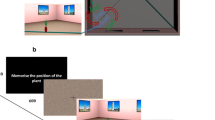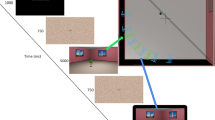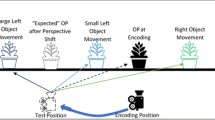Abstract
Results suggesting that changing perspective and switching across spatial environments held in memory are processes that take place in parallel were obtained from a task-switching experiment. Participants learned layouts of objects in two virtual rooms and then were asked to use their memories to locate the objects from various imagined viewing perspectives. Results revealed that, even after experiencing multiple perspectives, participants maintained viewpoint-dependent memories for the layouts, and that the latencies for changing perspective within and across environments followed a different pattern depending on whether participants imagined adopting the preferred view.
Access this chapter
Tax calculation will be finalised at checkout
Purchases are for personal use only
Preview
Unable to display preview. Download preview PDF.
Similar content being viewed by others
References
Avraamides, M.N.: Spatial updating of environments described in texts. Cognitive Psychology 47, 402–431 (2003)
Avraamides, M.N., Carlson, R.A.: Egocentric organization of spatial activities in imagined navigation. Memory & Cognition 31, 252–261 (2003)
Avraamides, M.N., Klatzky, R.L., Loomis, J.M., Golledge, R.G.: Use of cognitive vs. perceptual heading during imagined locomotion depends on the response mode. Psychological Science 15, 403–408 (2004)
Brockmole, J.R., Wang, R.F.: Changing perspective within and across environments. Cognition 87, B59–B67 (2003)
Brockmole, J.R., Wang, R.F.: Switching between environmental representations in memory. Cognition 83, 295–316 (2002)
Christou, C.G., Bülthoff, H.H.: View dependence in scene recognition after active learning. Memory and Cognition 27, 996–1007 (1999)
Cowan, N.: An embedded-process model of working memory. In: Miyake, A., Shah, P. (eds.) Models of Working Memory: Mechanisms of Active Maintenance and Executive Control, pp. 62–101. Cambridge University Press, New York (1999)
Easton, R.D., Sholl, M.J.: Object-array structure, frames of reference, and retrieval of spatial knowledge. Journal of Experimental Psychology: Learning, Memory, & Cognition 21, 483–500 (1995)
Evans, G.W., Pezdek, K.: Cognitive mapping: Knowledge of real-world distance and location information. Journal of Experimental Psychology: Human Learning and Memory 6, 483–500 (1980)
Farell, M.J., Robertson, I.H.: Mental rotation and the automatic updating of body-center spatial relationships. Journal of Experimental Psychology: Learning, Memory, & Cognition 24, 227–233 (1998)
Franklin, N., Tversky, B.: Searching Imagined Environments. Journal of Experimental Psychology: General 119, 63–76 (1990)
Hirtle, S.C., Jonides, J.: Evidence of hierarchies in cognitive maps. Memory & Cognition 13, 208–217 (1985)
Jeannerod, M.: Mental imagery in the motor context. Neuropsychologia 33, 1419–1432 (1995)
Klatzky, R.L., Loomis, J.M., Beall, A.C., Chance, S.S., Golledge, R.G.: Spatial updating of self-position and orientation during real, imagined, and virtual locomotion. Psychological Science 9, 293–298 (1998)
Kosslyn, S.M.: Image and brain: The resolution of the imagery debate. MIT Press, Cambridge (1994)
Logan, G.D.: Toward an instance theory of automatization. Psychological Review 95, 492–527 (1988)
Loomis, J.M., Lippa, Y., Klatzky, R.L., Golledge, R.G.: Spatial updating of locations specified by 3-D sound and spatial language. Journal of Experimental Psychology: Learning, Memory, & Cognition 28, 335–345 (2002)
May, M.: Imaginal perspective switches in remembered environments: Transformation versus interference accounts. Cognitive Psychology 48, 163–206 (2004)
May, M.: Cognitive and embodied modes of spatial imagery. Psychologische Beiträge 38, 418–434 (1996)
McNamara, T.P.: How are the locations of objects in the environment represented in memory? In: Freksa, C., Brauer, W., Habel, C., Wender, K. (eds.) Spatial cognition III: Routes and navigation, human memory and learning, spatial representation and spatial reasoning, pp. 174–191. Springer, Berlin (2003)
McNamara, T.P.: Mental representations of spatial judgments. Cognitive Psychology 18, 87–121 (1986)
Mou, W., McNamara, T.P.: Intrinsic frames of reference in spatial memory. Journal of Experimental Psychology: Learning, Memory, & Cognition 28, 162–170 (2002)
Mou, W., McNamara, T.P., Valiquette, C.M., Rump, B.: Allocentric and egocentric updating of spatial memories. Journal of Experimental Psychology: Learning, Memory, and Cognition 28, 162–170 (2003)
Presson, C.C., Montello, D.R.: Updating after rotational and translational body movements: Coordinate structure of perspective space. Perception 23, 1447–1455 (1994)
Richardson, A.E., Montello, D.R., Hegarty, M.: Spatial knowledge acquisition from maps and from navigation in real and virtual environments. Memory & Cognition 27, 741–750 (1999)
Rieser, J.J.: Access to knowledge of spatial structure at novel points of observation. Journal of Experimental Psychology: Learning, Memory, & Cognition 15, 1157–1165 (1989)
Rieser, J.J., Guth, D.A., Hill, E.W.: Sensitivity to perspective structure while walking without vision. Perception 15, 173–188 (1986)
Shelton, A.L., McNamara, T.P.: Systems of spatial reference in human memory. Cognitive Psychology 43, 274–310 (2001)
Stevens, A., Coupe, P.: Distortions in judged spatial relations. Cognitive Psychology 10, 422–437 (1978)
Wexler, M., Kosslyn, S.M., Berthoz, A.: Motor processes in mental rotation. Cognition 68, 77–94 (1998)
Wraga, M.: Thinking outside the body: An advantage for spatial updating during imagined versus physical self-rotation. Journal of Experimental Psychology: Learning, Memory, & Cognition 29, 993–1005 (2003)
Author information
Authors and Affiliations
Editor information
Editors and Affiliations
Rights and permissions
Copyright information
© 2005 Springer-Verlag Berlin Heidelberg
About this paper
Cite this paper
Avraamides, M.N., Kelly, J.W. (2005). Imagined Perspective–Changing Within and Across Novel Environments. In: Freksa, C., Knauff, M., Krieg-Brückner, B., Nebel, B., Barkowsky, T. (eds) Spatial Cognition IV. Reasoning, Action, Interaction. Spatial Cognition 2004. Lecture Notes in Computer Science(), vol 3343. Springer, Berlin, Heidelberg. https://doi.org/10.1007/978-3-540-32255-9_15
Download citation
DOI: https://doi.org/10.1007/978-3-540-32255-9_15
Publisher Name: Springer, Berlin, Heidelberg
Print ISBN: 978-3-540-25048-7
Online ISBN: 978-3-540-32255-9
eBook Packages: Computer ScienceComputer Science (R0)





